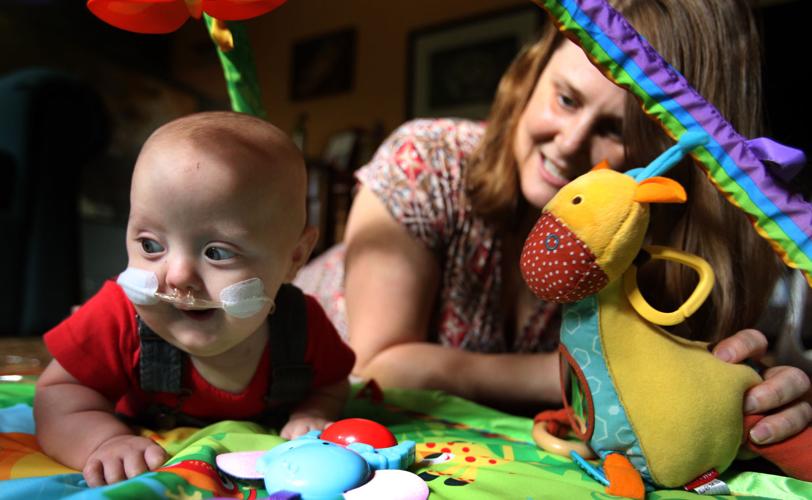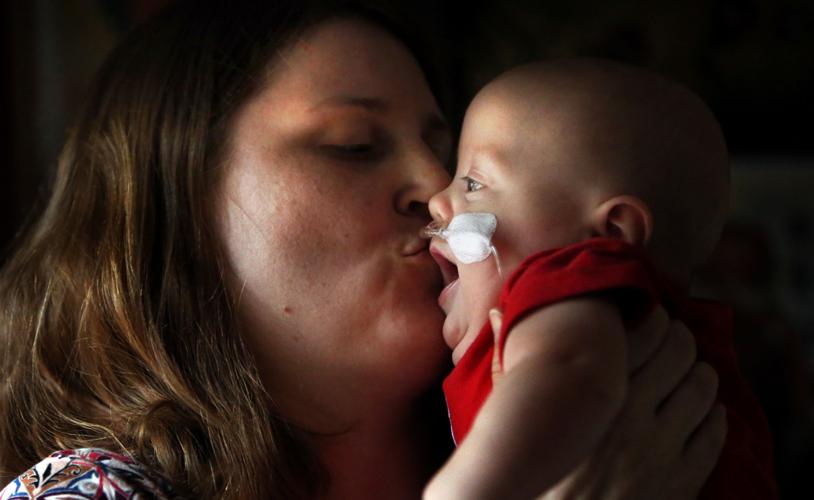When Theodore was born 16 weeks premature on Dec. 21 last year, he weighed just over a pound and a half.
Katherine Daubert, the child’s mother and a Pima County public defender, said her frail son spent the first four-and-a-half months of his life in a neonatal intensive care unit because he could not breath or eat on his own. He didn’t come home until May 6.
That was an interesting time for would-be parent employees of the county.
Less than two months prior, the board of supervisors approved a parental leave policy, making Pima the first county and the second public body, after the University of Arizona, in the state to do so, according to a county news release.
It allowed for eligible parents to take six weeks of leave at two-thirds pay and took effect on July 1.
The terms of leave are made clear on the first page of the policy: “eligible employees may be granted up to six continuous work weeks of parental leave within the first 12 weeks after the birth or adoption of a child,” it reads, seeming to disqualify Daubert.
But further down, the policy also seems to anticipate more complicated births, like Theodore’s: “this procedure cannot anticipate or address every situation that might occur with respect to parental leave eligibility and the use of parental leave. In such circumstances, HR-Leave Administration will address each request on a case-by-case basis.”
Daubert felt she deserved such consideration.
“What is that provision in place for if not for a child that was born 16 weeks prematurely?” she asked.
Daubert started 12 weeks of unpaid leave on May 13, as allowed by the federal 1993 Family and Medical Leave Act, and was set to start work again today. She supplemented that time off with paid sick and vacation leave. What she asked the county’s human resources department was for paid parental leave to kick in on July 1 and last until her FMLA expired.
“I was really only hoping to get the five weeks of pay,” she said.
On July 1, the first day of the policy, Daubert got her answer: “At this time, your request for parental leave is being denied,” reads an email from HR supervisor Doreen Press, provided to the Star by Daubert.
In a followup email, Press clarified that the decision was reached because the request was not made “within the first 12 weeks of the date of the birth.”
“Taking parental leave within the first 12 weeks of his birth would not have done either of us any good,” she wrote in response. “He was not yet at a developmental stage where he could benefit from regular contact with his mother. It also would not have done me any good. I am a lawyer, not a doctor.”
In contrast, since coming home in May, Daubert has been caring for Theodore, who has been on oxygen and going to regular doctor’s appointments, and working hard to get him to nurse.
HR allowed Daubert to present her case to the county’s Health Insurance Benefit and Wellness Advisory Committee for review on July 26, and the board sent its recommendation on July 29.
“I regret to inform you that the … committee voted unanimously 7-0 to uphold the decision denying your request for parental leave,” the letter, a copy of which Daubert gave the Star, reads in part.
Allyn Bulzomi, HR director, said Daubert’s case was difficult to approve for a number of reasons, partly because both Theodore’s birth and return home came before the policy started, even though the date range she requested came after.
“The policy says you have to take the leave within the first 12 weeks of birth,” he said, adding later: “It all happened before July 1, so I can’t retroactively apply it.”
When asked what might have happened if Theodore had been born after the policy took effect, Bulzomi said, “yes, that would be a special circumstance, and yes we would have considered that.”
“We would have reviewed it,” he added. “I don’t know if we would have approved it.”
Though just over a month into the policy, Bulzomi said eight county employees are already enjoying the benefit, and there haven’t been any other comparably complicated applications. County administration estimated that there are 145 “parental events” annually, which include adoptions and becoming foster parents, and that providing six weeks of leave at 75 percent pay would cost roughly $823,000, according to a March memorandum.
Though her parental leave request has been denied, Bulzomi said options remain for Daubert. In her denial letter from the advisory committee, it suggested she apply for the county’s catastrophic leave bank. The bank was established in 2013 and allows employees to essentially pay a premium of 16 hours of accrued leave in exchange for up to 240 hours of leave for qualifying events. Those include caring for a loved one, Bulzomi said.
“The county has a very generous leave system,” he added.
Daubert said she intends to sign up for the so-called CAT Bank, but hopes to not need it now that Theodore is doing better. She also said the precedent set by her denial could incentivize other county employees with premature babies to take leave even while their children are in intensive care, and then take even more leave when children finally come home.
In her office, Daubert said, such unpredictable leave-taking would “wreak havoc” on both colleagues and clients. A simpler solution, according to Daubert, is to simply allow for flexibility in rare cases like hers, as the policy already seems to.
“Even though they have the ability to use discretion, they are choosing not to,” she said.





